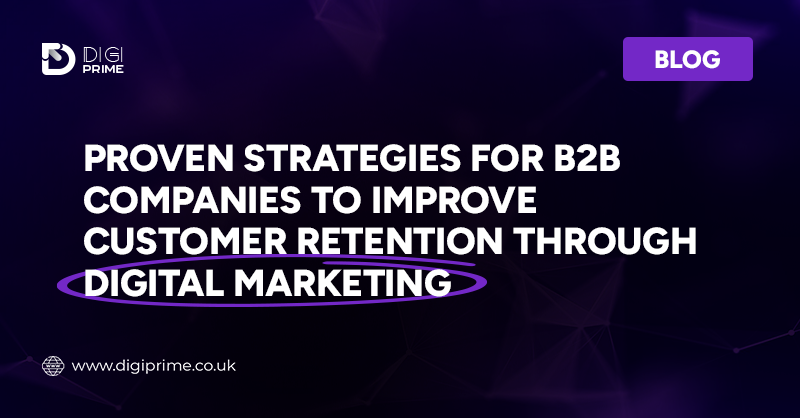In the competitive world of B2B commerce, retaining existing customers is just as crucial as acquiring new ones. Effective customer retention not only fosters long-term relationships but also significantly impacts overall business growth and stability. To achieve this, B2B companies must leverage digital marketing strategies that cater to their unique needs. This guide will explore actionable tactics to enhance customer retention and drive sustained success through digital marketing.
Understanding the Customer Journey
To retain customers effectively, it is essential to first understand their journey. Mapping the customer journey involves identifying each stage a client goes through, from initial contact to becoming a loyal customer. This process helps pinpoint key touchpoints where targeted digital marketing efforts can make a significant impact.
By creating detailed customer personas and mapping out their journey, B2B companies can gain insights into their customers’ behaviors, preferences, and pain points. This information allows for more tailored and effective marketing strategies, ensuring that each interaction is relevant and valuable.
Harnessing Data-Driven Insights
Data is a powerful ally in the quest for better customer retention. By analyzing customer behavior and feedback, B2B companies can gain valuable insights into what drives customer satisfaction and loyalty.
Implementing advanced analytics tools, such as Google Analytics, HubSpot, or Salesforce, enables businesses to track customer interactions and gather actionable data. Analyzing this data reveals patterns and trends, allowing companies to refine their marketing strategies and address any areas that may be affecting customer retention.
Personalizing Communication
Personalization is a key factor in building strong customer relationships. It involves more than just addressing customers by name; it requires delivering content and offers that are tailored to their specific needs and interests.
Segmenting your audience based on criteria such as industry, company size, or past interactions allows for targeted marketing campaigns. By creating personalized email content, relevant product recommendations, and tailored offers, B2B companies can foster a deeper connection with their customers, making them feel valued and understood.
Enhancing Email Marketing
Email marketing remains a cornerstone of customer retention strategies. When executed effectively, it keeps your brand top-of-mind and encourages repeat engagement from existing clients.
Developing engaging and valuable content is crucial for successful email marketing. Automated email sequences can be set up for various stages of the customer lifecycle, including onboarding, re-engagement, and regular updates. These automated touchpoints ensure that customers receive timely and relevant information, reinforcing their connection with your brand.
Providing Exceptional Customer Support
Exceptional customer support is vital for retaining clients and building strong, lasting relationships. Digital channels offer multiple ways to deliver outstanding support and enhance the customer experience.
Implementing live chat on your website provides real-time assistance, addressing customer inquiries promptly and efficiently. Additionally, help desk and ticketing systems, such as Zendesk or Freshdesk, help manage customer interactions and ensure that issues are resolved quickly, contributing to overall customer satisfaction.
Creating Valuable Content
Content marketing plays a significant role in customer retention by providing ongoing value to your audience. Regularly publishing high-quality content helps maintain customer engagement and positions your company as a trusted industry authority.
A well-planned content calendar ensures a steady stream of relevant content, such as blogs, whitepapers, and case studies. By addressing industry trends, sharing best practices, and offering valuable insights, B2B companies can keep their audience engaged and foster long-term loyalty.
Leveraging Social Media for Engagement
Social media platforms are excellent tools for maintaining connections with customers and building a sense of community around your brand. Engaging with your audience on platforms like LinkedIn, Twitter, and Facebook helps keep your brand visible and encourages ongoing interaction.
Running targeted social media campaigns and promotions can also drive engagement and strengthen customer relationships. By sharing updates, industry news, and interactive content, B2B companies can keep their audience informed and engaged.
Implementing Customer Loyalty Programs
Customer loyalty programs are effective tools for incentivizing repeat business and showing appreciation for continued support. Designing a rewards program that offers discounts, exclusive content, or early access to new products can motivate customers to remain loyal to your brand.
Promoting the loyalty program through various marketing channels ensures that customers are aware of its benefits and encourages participation. A well-structured program not only rewards existing customers but also attracts new ones by demonstrating the value of long-term relationships.
Gathering and Acting on Customer Feedback
Regularly gathering and acting on customer feedback is essential for improving retention efforts. Surveys and online reviews provide valuable insights into customer experiences and highlight areas for improvement.
By using tools like SurveyMonkey or Typeform to conduct surveys and monitoring online reviews, B2B companies can address concerns and enhance their offerings. Acting on feedback demonstrates a commitment to customer satisfaction and helps build stronger, more trusting relationships.
Measuring and Optimizing Retention Strategies
Finally, measuring the effectiveness of your retention strategies is crucial for ongoing improvement. Tracking key metrics such as customer retention rate, churn rate, and lifetime value provides insights into the success of your efforts.
Regularly reviewing these metrics and adjusting strategies based on performance data helps optimize retention efforts. By continuously refining your approach, B2B companies can ensure that their customer retention strategies remain effective and aligned with their business goals.
Conclusion
Effective customer retention is essential for B2B companies looking to build long-term success and stability. By understanding the customer journey, leveraging data-driven insights, personalizing communication, and employing various digital marketing strategies, businesses can foster stronger relationships and drive sustained growth. Implementing these proven strategies will not only enhance customer loyalty but also contribute to the overall success of your B2B enterprise.

